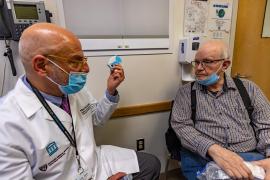State Highlights: Ga. Lawmakers Wrestle With Surprise Medical Billing Solution; In N.H., Dartmouth-Hitchcock Cancer Center Gets OK In Dispute Over Fundraising Cash
Outlets report on news from Georgia, New Hampshire, New York, Florida, Virginia, Wisconsin, Ohio, New Jersey and California.
Atlanta Journal Constitution:
Surprise Billing For Medical Care Gets Georgia State Senate Hearing
Surprise billing of medical patients – when people go to a hospital in their insurance network but get surprised by a bill from an out-of-network doctor anyway – is a big problem. Legislators are still wrestling with a solution. On Tuesday the state Senate’s Health and Human Services Committee met to discuss one proposal on surprise billing: Senate Bill 8, sponsored by the committee’s chairwoman, Renee Unterman, R-Buford. (Hart, 2/7)
Georgia Health News:
Senate Panel Hears Surprising Testimony On Surprise Medical Bills
The Senate Health and Human Services Committee heard testimony on a proposal to halt these medical bills, which can come from ER doctors, anesthesiologists, radiologists, pathologists and others who are not in a patient’s insurance network — even though the hospital where they work is. “It’s a very complicated issue,’’ said Sen. Renee Unterman (R-Buford), who chairs the panel and is a nurse by profession. She is the sponsor of Senate Bill 8. Health insurers and medical providers can’t agree on a solution, she said. (Miller, 2/7)
Atlanta Journal Constitution:
Medical Marijuana Bill Passes Georgia Senate Committee
Georgia’s limited medical marijuana law would be expanded to include autism, under legislation passed Tuesday in a state Senate committee. Senate Bill 16 is the first of several bills dealing with the law’s expansion to move this year, although medical marijuana advocates oppose the bill because it would also roll back the maximum THC level in the cannabis oil now allowed here. (Torres, 2/7)
New Hampshire Union Leader:
Report: Cancer Center Can Use Fundraiser For Operating Costs
Dartmouth-Hitchcock’s Norris Cotton Cancer Center properly used $6.1 million raised for cancer research, a state regulator has ruled, in a dispute that led its former director to file a whistleblower lawsuit. Thomas Donovan, head of the state Justice Department’s Charitable Trusts Unit, said the fundraising dollars, including money from the center’s signature fundraiser, The Prouty, were directed to be used for the cancer center’s benefit. The review did not find language restricting the gift from being used for the center’s operations, according to Donovan. (Cousineaug, 2/7)
New Hampshire Union Leader:
State Numbers Show A Slow Start To Winter Stomach Bug
The mild winter has meant less shoveling, fewer warm layers and something else — fewer outbreaks of the dreaded winter stomach bug. Beth Daly, chief of the state’s Bureau of Infectious Disease Control, said there’s been only 15 reported outbreaks of norovirus illness since December. The norovirus season usually runs from December until March and produces approximately 70 outbreaks, Daly said. While the numbers seem to be lower than usual, Daly said it’s too soon to predict if this season will be an easier one on Granite Staters’ bellies. (Grosky, 2/7)
The Associated Press:
Company Accused Of Scamming 9/11, NFL Concussion Victims
A company that promised sick 9/11 responders and NFL players with concussion injuries that it could “cut through red tape” to get their payouts faster lured them into advances that meant hundreds of thousands of dollars in illegally high interest and fees, authorities said Tuesday. In a lawsuit filed Tuesday, New York’s attorney general and the Consumer Financial Protection Bureau allege that New Jersey-based RD Legal Funding and its founder Roni Dersovitz snared 9/11 responders who are struggling with cancer and respiratory illness as well as former NFL players with brain injuries into taking costly advances on their settlements. (Sweet, 2/7)
Miami Herald:
Florida Marijuana Rules Too Restrictive, State Told In Fort Lauderdale
New medical marijuana regulations proposed by state health officials would block patients from timely and affordable access to medication, restrict physicians in treating their patients, and potentially undercut the development and distribution of quality medicine, an overflow crowd told Florida Department of Health officials Tuesday morning in Fort Lauderdale. (Smiley, 2/7)
Richmond Times Dispatch:
Culpeper Cardiologist Accused Of Striking Hospital Nursing Director
A Culpeper cardiologist faces a misdemeanor assault and battery charge stemming from a reported confrontation with a female nursing director inside Novant Health UVa Health System Culpeper Medical Center last week. According to the official criminal complaint filed in Culpeper County General District Court, Dr. Zia Roshandel, 47, of Blue Ridge Cardiovascular Associates is accused of hitting Irene C. D’Gama in the shoulder following what she described as a heated argument inside her office Thursday. (Simmons, 2/7)
Milwaukee Journal Sentinel:
Publishing Firm Sues To Stop Medical Faxes It Has Mistakenly Received Since 2015
If you fax private medical information to a health management company in Ohio, you don't expect it to arrive instead at a small publishing firm in Milwaukee. But that's exactly what has been happening since the summer of 2015. (Stingl, 2/7)
The Associated Press:
Clinic Falsely Told Dozens They Had Alzheimer’s, Suits Say
Shawn Blazsek knew a string of concussions from high school football and boxing was catching up with him. He would go days without sleeping and was forgetting how to tie his shoes. Still, at age 33, he was stunned after being told he had Alzheimer’s disease. He started planning out who would take care of his four kids if something happened to his wife, and thought about how hard it would be for them when he could no longer recognize his family. So he stuffed fistfuls of sleeping pills into a bottle and wrote himself a note, vowing to swallow all of them when he wasn’t able to remember the names of his children. That day never came. (Seewer, 2/8)
The Associated Press:
Dozens Plead Guilty, But Doctor Goes To Trial In $200M Fraud
Details of a long-running health care kickback scheme that allegedly featured prostitutes, cash-stuffed envelopes and private jet junkets began to unfold in federal court Tuesday as a 79-year-old physician went on trial. Dr. Bernard Greenspan isn’t alleged to have engaged in any of the seamier activities surrounding now-defunct Biodiagnostic Laboratory Services, but prosecutors painted him as eager to accept about $200,000 in bribes from the company over several years in exchange for sending his patients’ blood samples there. (Porter, 2/7)
San Jose Mercury News:
Stanford Team Is Growing Healthy Skin For Diseased Patients
Small sheets of healthy skin are being grown from scratch at a Stanford University lab, proof that gene therapy can help heal a rare disease that causes great human suffering. The precious skin represents growing hope for patients who suffer from the incurable blistering disease epidermolysis bullosa — and acceleration of the once-beleaguered field of gene therapy, which strives to cure disease by inserting missing genes into sick cells. (Krieger, 2/7)
Miami Herald:
Fugitive Who Fled To Cuba To Evade $130 Million Healthcare Fraud Case Arrested At MIA
Soon after the feds broke up a family-run chain of clinics that tried to steal $130 million from Miami-Dade Public Schools and a string of major U.S. companies, a trio of Cuban immigrants fled to Mexico and eventually back home to the island. For almost two years, the chain’s boss, Reynaldo Castillo, and his right-hand man, Jose Gerardo Gonzalez, hid in Cuba. Castillo and Gonzalez were wanted for their leading roles in an indictment charging a total 16 defendants with healthcare fraud in March of 2015. (Weaver, 2/7)
Sacramento Bee:
UC Davis Researchers Find Mold, Fungi In Medical Marijuana And Warn Of Health Risks
In uneasy news for medical marijuana users, UC Davis researchers have identified potentially lethal bacteria and mold on samples from 20 Northern California pot dispensaries, leading them to warn patients with weakened immune systems to avoid smoking, vaping or inhaling aerosolized cannabis. (Buck, 2/7)






